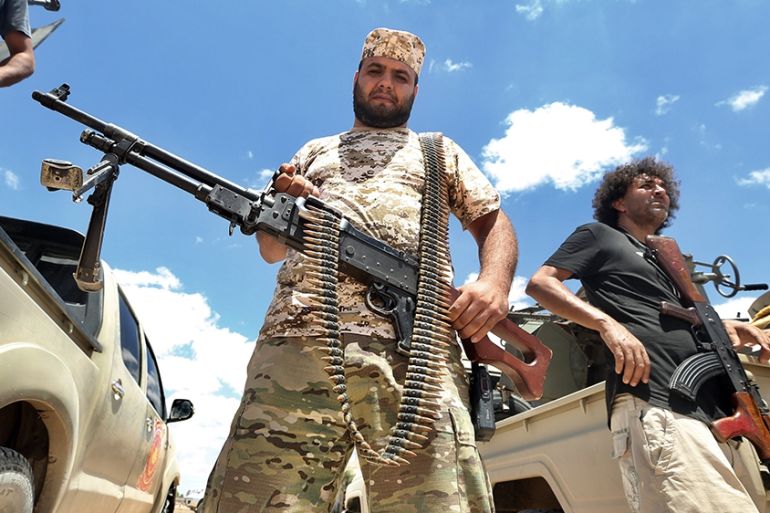Warring Libya factions eye prisoner release as talks continue
UN mission says Egypt talks addressed confidence-building measures, security arrangements, and the role of Petroleum Facilities Guard.

Warring sides in Libya have agreed to resume military talks next week after meeting in Egypt, the United Nations mission said, adding it hoped the step would pave the way towards a lasting ceasefire.
The UN-recognised Government of National Accord (GNA) in June turned back a 14-month assault on the capital Tripoli by the eastern-based self-styled Libyan National Army (LNA) led by renegade military commander Khalifa Haftar. The two are now dug in along a front line near the strategic city of Sirte.
Keep reading
list of 4 itemsTurkey slams ‘biased’ EU sanctions over Libya arms embargo
GNA head says fragile Libya peace at risk by rival forces
UN condemns clashes in Libya capital, urges security reforms
The UN mission said the Egypt talks addressed confidence-building measures, security arrangements, and the role of the Petroleum Facilities Guard, which is supposed to protect energy infrastructure but is often made up of local groups with their own agendas.
It said recommendations – including prisoner swaps and releases and expediting the reopening of air and land transport links – would be presented to military delegations.
The UN-led process has run in parallel with other tracks held by factions within both the GNA and LNA and between outside powers involved in the conflict.
Turkey supports the GNA while the LNA is backed by the United Arab Emirates, Russia and Egypt.
The UN has accused outside countries, including those who formally backed its ceasefire process, of breaking an arms embargo to supply the sides with weapons and fighters.
‘Counterterrorism operations’
Meanwhile, US Defence Secretary Mark Esper arrived on Wednesday in neighbouring Tunisia, his first stop on a North Africa tour where he was set to reaffirm US engagement in the Maghreb region.
Esper was set to meet President Kais Saied and Defence Minister Ibrahim Bartagi before delivering a speech at the North Africa American Cemetery in Carthage, where more than 2,800 US soldiers were buried, most of them killed during World War II.
As the raging conflict in Libya has attracted foreign fighters and world powers backing rival sides, Washington has increasingly cooperated with the Tunisian military, particularly on counterterrorism operations.
Washington in 2015 classified Tunisia as a Major Non-NATO Ally, allowing for reinforced military cooperation.
Since 2011, it has invested more than $1bn in the Tunisian military, according to the US’s Africa command, Africom.
Esper is set to visit neighbouring Algeria on Thursday, becoming the first US defence secretary to do so since Donald Rumsfeld in 2006.
Esper will then head to Morocco, the other US Major Non-NATO Ally in the Maghreb region.
During his Tunisia visit, the defence chief is expected to warn of growing Russian and Chinese influence on the continent, according to a US official speaking before the trip.
The other goal of the visit was to reinforce ties and discuss the threat of ISIL (ISIS) fighters, the official said.
Last May, the head of Africom said the United States would send more troops to the country in light of the deteriorating situation in Libya, triggering an outcry in Tunisia.
Africom later clarified it was only deploying “a small training unit” that would not engage in combat missions, and the Tunisian government said there were no plans for a US base in the country.